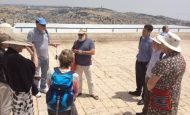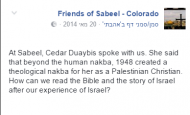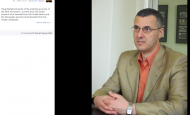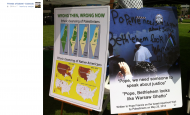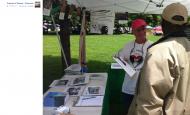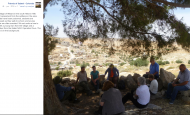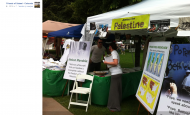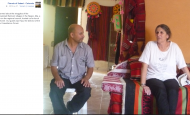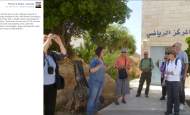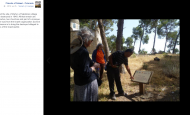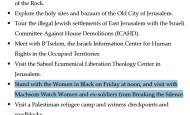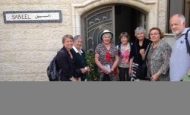Political Israeli NGOs hosting Antisemitic NGO Sabeel
Sabeel Colorado, a branch of the pro-BDS NGO Sabeel, is currently promoting its 2017 “Fact-Finding Trip” in Israel and the Palestinian Authority. The trip “Highlights” will include meeting with the Israeli NGOs B’Tselem, Breaking the Silence, Machsom Watch, and Women in Black.
- Based in Jerusalem and registered as a non-profit in Israel, Sabeel was founded in 1989 and is directed by Naim Ateek, former Canon of St. George’s Cathedral in Jerusalem.
- Receives a significant portion of its funding from Christian aid societies in various European countries. Funders between 2011-2015 include Diakonia (Sweden), Kierk an Actie (the Netherlands), The Central Mennonite Committee (Canada), The Presbyterian Church in USA, The United Church of Christ and FOSNA chapters in North America, UK, Norway, and others.
- Active in anti-Israel political campaigns and a leader of church divestment campaigns. Promotes the Kairos Palestine document, which denies the Jewish historical connection to the land of Israel. Sabeel director Naim Ateek has allegedly stated, “If the Jewish people had a right to a homeland it should be in Germany, not Palestine.” (emphasis added.)
- Sabeel Colorado is the Colorado-based chapter of Friends of Sabeel North America (FOSNA), one of many Sabeel chapters throughout the world. FOSNA criticizes Christian Zionism as “a prime example of the misuse of the Bible to promote violence, racism and injustice,” based on “mistaken premises” that are “not authentic to the Bible.” (emphasis added.)
- Sabeel Colorado trips date back to 2011, and since 2014 have met with the following NGOs: Breaking the Silence, B’Tselem, Machsom Watch, Israeli Committee against House Demolitions, Alternative Information Center, Women in Black (attending a protest), and Christian Peacemaker Teams.
- According to their website and Facebook page, Sabeel Colorado regularly supports BDS campaigns and a “one state solution,” as well publishing blatant anti-Israeli content.
- Mark Braverman, a member of FOSNA’s advisory board and frequent speaker at Sabeel events, has a record of making antisemitic statements, including the following sentiments:
- Zionism has hijacked and is killing Judaism.
- Christianity is more mature than Judaism.
- Advocating supercessionism, declaring Jewish Theology a disaster
- It is not Christian to support Israel
- Jews believe they are exceptional and are isolationist, and paranoid
(Click here to read Braverman’s complete quotes.)
In addition, the NGO frequently employs antisemitic rhetoric:
- Sabeel claims that Palestinians represent a modern-day version of Jesus’ suffering, using “liberation theology,” supercessionist rhetoric and the concept of deicide to demonize Israel. Sabeel spokespeople, particularly founder Ateek, disparage Judaism as “tribal,” “primitive,” and “exclusionary,” while contrasting this to Christianity’s “universalism” and “inclusiveness.” Ateek has also used deicide imagery against Israel and referred to Jesus as a “Palestinian.”
- Ateek has declared that, “The establishment of Israel was a relapse to the most primitive concepts of an exclusive, tribal God.” (emphasis added.)
- In another example, Ateek took advantage to manipulate Lent by saying that, “As we approach Holy Week and Easter, the suffering of Jesus Christ at the hands of evil political and religious powers two thousand years ago, is lived out again in Palestine…In this season of Lent, it seems to many of us that Jesus is on the cross again with thousands of crucified Palestinians around him. It only takes people of insight to see the hundreds of thousands of crosses throughout the land, Palestinian men, women, and children being crucified. Palestine has become one huge Golgotha. The Israeli government crucifixion system is operating daily. Palestine has become the place of the skull…” (emphasis added.)
- Sabeel’s 2014 annual Christmas message compares the historical period in which Jesus lived to present time, claiming that, “There are certain similarities between the political conditions in Palestine during the times of Jesus’ birth and the political situation in Palestine today. There is a flagrant occupation that dominates and oppresses people; and there are words that describe what people go through: fear, insecurity, instability, suffering, grief, despair, and other negative feelings that a repressive empire and an Israeli rightwing government can produce.”
In the Media
- B'Tselem, Breaking the Silence, to Collaborate with Anti-Israel NGO Sabeel The Jewish PressNovember 06, 2016
